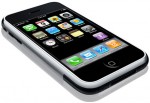
I read a very good and interesting post on James Critland’s blog. He is somewhat concerned about the trend for mobile wireless providers to no longer offer unlimited data service for a flat fee. I find it interesting that all of these companies seemed to have reached the same conclusions at the same time. But anyway…
The general surmise of James’ post is that the average person will not be able to afford online radio through a 3 or 4G device because of the limited minutes available and the additional charges incurred. (35 quid is about $50.00) To make that meaningful to a US audience, I decided to redo some of James’ math.
Iphones are primarily serviced through ATT. ATT has two different data plans that are coupled with voice plans in a bundle. For example, a 450-minute voice plan and a 200 Mb data plan will cost $55.00. A 900-minute voice plan with a 2 Gb data plan will run $85.00.
Here are a few interesting tidbits and some good math:
- A 64 kbps stream runs 7.68 kb per second, or 460 kb per minute (1 kilobit per second = 0.12-kilobytes)
- 1 hour of online listening equals 27,640 k bytes of data transferred
- The 200 Mb plan cost $15.00 with voice plan, the 2 Gb plan cost $25.00 with voice plan
- The 200 Mb plan would allow for 7 hours of listening time if no other data use occurred
- The 2 Gb plan would allow for 72 hours of listening time if no other data use occurred
- Beyond those data transfer amounts, extra charges are incurred
Almost 50% of the time spent listening to all radio sources (terrestrial, satellite, online) is in the car. The average person in the US listens to the radio for about 3 hours per day or 90 hours per month. Half of that time would be 45 hours or so.
Clearly, anyone who is more than a casual listener of online radio will need the 2 Gb plan. However, given the paucity of entertainment available from traditional radio sources, this is not an outlandish amount to pay. I remember in the ’70s when folks were saying cable TV would never catch on.
